Karolina Hird, Riley Bailey, Angelica Evans, and Mason Clark
Ukraine used US-provided ATACMS long-range missiles to strike Russian targets in occupied Ukraine for the first time on October 17. The Wall Street Journal and other Western media outlets confirmed on October 17 that the US “secretly” provided Ukraine with ATACMS with a range of 165km in recent days and reported that Ukrainian forces already used ATACMS to strike Russian-controlled airfields in occupied Berdyansk, Zaporizhia Oblast and Luhansk City, Luhansk Oblast.[1] Ukrainian President Volodymyr Zelensky also stated in his nightly address on October 17 that ATACMS “have proven themselves” but did not directly confirm ATACMS were used in these strikes, and multiple Russian sources claimed Ukrainian forces used ATACMS in the Berdyansk strike.[2] Various Russian sources amplified images reportedly of ATACMS M74 cluster submunitions found at the site of the strike in Berdyansk.[3] The US likely transferred the ATACMS systems in secret to provide Ukrainian forces operational surprise, and the overall shock in the Russian information space suggests that Ukraine achieved the desired effect. Ukrainian Special Operations Forces Command did not specify that Ukrainian forces used ATACMS in the strikes but stated that the strikes destroyed nine Russian helicopters of various models, other unspecified special equipment, an anti-aircraft missile launcher, an ammunition warehouse, and damaged runway infrastructure.[4] Footage reportedly from the Berdyansk airfield shows heavy fires and explosions due to the continued detonation of ammunition in an ammunition depot.[5] NASA Fire Information for Resource Management (FIRMS) data from October 17 also confirms heat signatures following explosions in Berdyansk but has not yet confirmed heat signatures at the Luhansk airfield.[6]
The Ukrainian ATACMS strikes on operationally significant Russian airfields in Ukraine will likely prompt the Russian command to disperse aviation assets and withdraw some aircraft to airfields further from the frontline. Russian forces notably operated rotary-wing aircraft from the Berdyansk airfield in the early months of the ongoing Ukrainian counteroffensive in western Zaporizhia Oblast to great effect against large mechanized Ukrainian assaults.[7] Previous satellite imagery of the Berdyansk airfield showed that Russian forces dispersed aircraft across the airfield, and Ukrainian forces were likely only able to conduct strikes on individual aircraft with previously available long-range missiles.[8] The cluster munition–armed version of the ATACMS long range missiles will allow Ukrainian forces to conduct strikes on Russian airfields that can more widely destroy Russian aircraft and other assets. Russian milbloggers immediately drew parallels between the Ukrainian strikes on the Berdyansk and Luhansk City airfields and a series of Ukrainian HIMARS strikes on the Chornobaivka airfield in Kherson Oblast during the 2022 Kherson counteroffensive.[9] The arrival of Western-provided HIMARS allowed Ukrainian forces to conduct repeated strikes on the Chornobaivka airfield, which caused significant Russian aviation losses, and Russian command withdrew military equipment and aviation from the airfield due to their inability to combat Ukrainian HIMARS strikes.[10] Russian milbloggers noted that Russian forces adapted their airfields to Ukrainian long-range strike capabilities but that ATACMS are a new missile threat which will similarly force the Russian command to adapt once again.[11] The Russian military has consistently shown it can adapt to new Ukrainian strike capabilities — but only after suffering initial and pronounced losses from Ukrainian capabilities Russian commanders realistically should have prepared for.
The likely dispersal of Russian aircraft at airfields throughout occupied Ukraine and the relocation of aviation assets further away from the frontline will likely disrupt Russian aviation support for defensive efforts and localized offensive operations. The relocation of aircraft to airfields further in the rear will likely impact the loitering time that Russian aviation will have to support operations. This will likely be particularly significant for Russian rotary-wing aircraft, which operated in relatively small sections of the frontline for long periods of time to degrade advancing mechanized Ukrainian forces at the beginning of the counteroffensive in June and July of 2023.[12] The dispersal of aviation assets at a larger number of airfields will also likely present the Russian Aerospace Forces (VKS) greater coordination and sustainment challenges.
The arrival of ATACMS long-range missiles also poses a significant threat to Russian ammunition depots in rear areas and will likely force the Russian command to choose between fortifying existing depots or further dispersing depots throughout occupied Ukraine. The arrival of HIMARS to Ukraine in June 2022 allowed Ukrainian forces to conduct an operationally significant interdiction campaign in support of counteroffensive operations in Kherson and Kharkiv oblasts, part of which targeted overly concentrated Russian ammunition depots.[13] The Russian command reluctantly moved away from using highly concentrated ammunition depots, extending Russian logistics along longer ground lines of communications (GLOCs), which ultimately complicated the provision of ammunition and supplies to the frontline to a certain degree.[14] ATACMS will likely present Russian forces with a similar challenge, and Russian forces can either focus on fortifying existing depots or create an even more dispersed and therefore over-extended logistics system for ammunition.
The Russian information space expressed widespread fear over the use of ATACMS, and Russian concerns over the possibility of future strikes will likely impact Russian decision-making beyond the current Ukrainian ability to sustain regular ATACMS strikes. Russian sources bemoaned the strikes on the Berdyansk and Luhansk City airfields as one of the most devastating Ukrainian strikes on a Russian target since the start of Russia’s full-scale invasion of Ukraine.[15] Russian sources particularly credited the use of ATACMS for the severity of the strike and expressed fears that the Russian command would not adapt quickly enough to the new missile threat.[16] The Russian command will likely have to consider the potential Ukrainian use of ATACMS when making operational and tactical decisions about the placement of military assets regardless of the frequency of such strikes, and the current level of Russian concern suggests that this calculation may be particularly pronounced in the coming weeks. Ukraine has likely only received a limited number of ATACMS, however, and will need more if it is to sustain and amplify these initial effects.[17]
Ukrainian forces continued counteroffensive operations and advanced near Bakhmut and in western Zaporizhia Oblast. The Ukrainian General Staff reported that Ukrainian forces continued counteroffensive actions south of Bakhmut and had partial success west of Verbove (10km east of Robotyne in western Zaporizhia Oblast).[18] Geolocated footage posted on October 16 also indicates that Ukrainian forces advanced northwest of Zaliznyanske (9km northwest of Bakhmut).[19]
The US confirmed on October 17 that all 31 previously pledged American M1 Abrams main battle tanks have arrived in Ukraine.[20] US Army Europe and Africa (USAREUR-AF) Spokesperson Colonel Martin O’Donnell reported that all of the Ukrainian servicemembers who trained on the tanks alongside US forces in Germany have also returned to Ukraine.[21] US military officials noted that it will likely take some time for Ukraine to deploy the Abrams to the frontline.
The Russian Ministry of Defense (MoD) posted footage on October 17 of Russian forces operating the new TOS-2 “Tosochka” thermobaric artillery system in Ukraine.[22] The Russian MoD claimed that Central Military District (CMD) Radiation, Chemical, and Biological Defense Troops used the TOS-2 system to strike a Ukrainian fortified area in an unspecified area of the front, potentially in reference to Avdiivka, where some CMD elements have recently deployed to support offensive operations north of Donetsk City.[23] Russian media responded to the MoD’s footage and noted that the TOS-2 is a modernized and improved version of the TOS-1A “Solntsepek” system that Russian forces have heavily employed across the theater in Ukraine.[24] Thermobaric artillery systems such as the TOS-1A and TOS-2 are military district–level assets, and their commitment to certain sectors of the front may be indicative of Russian operational prioritization of certain areas.[25]
The Russian Ministry of Internal Affairs (MVD) reportedly issued an informal warning to a prominent Russian milblogger who is often critical of the Ministry of Defense’s conduct of the war on October 16 for discrediting the Russian military, the latest in a series of government efforts to gain further control over the Russian information space. The milblogger claimed on October 17 that he writes candidly about the situation on the front to better inform Russian military leadership about the issues on the front that local commanders are unwilling to report.[26] The milblogger claimed that MVD is targeting Russian milbloggers who helped publicize the mistreatment of elements of the Russian 205th Separate Motorized Rifle Brigade (49th Combined Arms Army, Southern Military District) in the Kherson direction in late August 2023, which ultimately resulted in the removal of the brigade’s commander.[27] The milblogger articulated a list of 14 other channels that “speak the truth and are not afraid,” some of which ISW has observed be critical of the Russian military.[28] The milblogger likely shared this list of channels to coalesce support for targeted milbloggers, and the list does not indicate that these channels are part of an organized group.
Russia continues to set various legislative conditions to prepare the information space for the March 2024 presidential elections. The Russian State Duma adopted a bill in its first reading on October 17 that clarifies provisions on the Russian law on presidential elections and stipulates that campaign materials cannot be shown on sites restricted by the Russian Federal Service for Supervision of Communications, Information Technology and Mass Media (Roskomnadzor).[29] The bill will also ban people from taking photographs and videos at polling stations, require registered candidates to submit information to their electoral commission if they have a criminal record, and establish a cost limit for the production of campaign materials.[30] Several of these provisions already exist in laws governing basic electoral rights, but these provisions will clarify the specific law on presidential elections in advance of the March 2024 election cycle.
Key Takeaways:
- Ukraine used US-provided ATACMS long-range missiles to strike Russian targets in occupied Ukraine for the first time on October 17.
- The Ukrainian ATACMS strikes on operationally significant Russian airfields in Ukraine will likely prompt the Russian command to disperse aviation assets and withdraw some aircraft to airfields further from the frontline.
- The Russian military has consistently shown it can adapt to new Ukrainian strike capabilities — but only after suffering initial and pronounced losses from Ukrainian capabilities Russian commanders realistically should have prepared for.
- The arrival of ATACMS long-range missiles also presents a significant threat to Russian ammunition depots in rear areas and will likely force the Russian command to choose between fortifying existing depots or further dispersing depots throughout occupied Ukraine.
- The Russian information space expressed widespread fear over the use of ATACMS, and Russian concerns over the possibility of future strikes will likely impact Russian decision-making beyond the current Ukrainian ability to sustain regular ATACMS strikes.
- Ukrainian forces continued counteroffensive operations and advanced near Bakhmut and in western Zaporizhia Oblast.
- The Russian Ministry of Internal Affairs (MVD) reportedly issued an informal warning to a prominent Russian milblogger who is often critical of the Ministry of Defense’s conduct of the war on October 16 for discrediting the Russian military.
- Russian forces continued offensive operations along the Kupyansk-Svatove-Kreminna line, near Bakhmut, near Avdiivka, southwest of Donetsk City, in the Donetsk-Zaporizhia Oblast border area, and in western Zaporizhia Oblast, and advanced in certain areas of the front.
- Russia continues to take steps to codify the inclusion of volunteer formations within Rosgvardia.
- The Russian Orthodox Church (ROC) continues efforts to consolidate control of orthodox diocese in occupied areas of Ukraine.
- Russian President Vladimir Putin held bilateral negotiations with Hungarian President Viktor Orban and Mongolian President Ukhnaagiin Khurelsukh in Beijing on October 17.
We do not report in detail on Russian war crimes because these activities are well-covered in Western media and do not directly affect the military operations we are assessing and forecasting. We will continue to evaluate and report on the effects of these criminal activities on the Ukranian military and the Ukrainian population and specifically on combat in Ukrainian urban areas. We utterly condemn these Russian violations of the laws of armed conflict, Geneva Conventions, and humanity even though we do not describe them in these reports.
- Russian Main Effort – Eastern Ukraine (comprised of two subordinate main efforts)
- Russian Subordinate Main Effort #1 – Capture the remainder of Luhansk Oblast and push westward into eastern Kharkiv Oblast and encircle northern Donetsk Oblast
- Russian Subordinate Main Effort #2 – Capture the entirety of Donetsk Oblast
- Russian Supporting Effort – Southern Axis
- Russian Mobilization and Force Generation Efforts
- Activities in Russian-occupied areas
- Russian Information Operations and Narratives
Russian Main Effort – Eastern Ukraine
Russian Subordinate Main Effort #1 – Luhansk Oblast (Russian objective: Capture the remainder of Luhansk Oblast and push westward into eastern Kharkiv Oblast and northern Donetsk Oblast)
Russian forces continued offensive operations along the Kupyansk-Svatove-Kreminna line on October 17 and made confirmed advances in the Kupyansk direction. Geolocated footage posted on October 17 shows that Russian forces advanced about 1.5km west of Yahidne towards Ivanivka, about 20km southeast of Kupyansk.[31] The Ukrainian General Staff reported that Russian forces unsuccessfully attacked in the Kupyansk direction near Synkivka (8km northeast of Kupyansk), Ivanivka (20km southeast of Kupyansk), and Kyslivka (23km southeast of Kupyansk) and in the Svatove direction near Stelmakhivka (15km northwest of Svatove) and Nadiya (15km southwest of Svatove).[32] Ukrainian Eastern Group of Forces Spokesperson Captain Ilya Yevlash reported that Russian forces are concentrating near Synkivka, Ivanivka, Stelmakhivka, and Nadiya in an effort to consolidate advantageous positions before the onset of more challenging weather conditions.[33] Russian milbloggers claimed that Russian forces continued offensive operations towards Kupyansk and improved their tactical positions northeast of Kupyansk and west of Svatove.[34] One milblogger claimed that Russian forces are advancing through fortified areas west of Ploshchanka (20km southwest of Svatove) and that Russian forces continue to strike Ukrainian crossings across the Oskil River that runs west of Svatove.[35]
The Russian Ministry of Defense (MoD) claimed that Ukrainian forces conducted limited and unsuccessful counterattacks along the Kupyansk-Svatove-Kreminna line on October 17.[36] Several Russian sources claimed that Ukrainian forces are unsuccessfully trying to dislodge Russian troops from their positions around Kupyansk and near Svatove.[37]
Russian Subordinate Main Effort #2 – Donetsk Oblast (Russian objective: Capture the entirety of Donetsk Oblast, the claimed territory of Russia’s proxies in Donbas)
Ukrainian forces continued offensive actions near Bakhmut on October 17 and made confirmed advances. Geolocated footage posted on October 16 indicates that Ukrainian forces advanced northwest of Zaliznyanske (9km northwest of Bakhmut).[38] The Russian Ministry of Defense (MoD) claimed that elements of the Russian Southern Grouping of Forces repelled nine Ukrainian attacks in the Donetsk direction.[39] A Kremlin-affiliated Russian milblogger claimed that Russian forces repelled Ukrainian attacks near Klishchiivka (7km southwest of Bakhmut).[40] Russian milbloggers claimed on October 16 that fighting continued near Orikhovo-Vasylivka (10km northwest of Bakhmut) and along the Klishchiivka-Andriivka-Kurdyumivka line (7–13km southwest of Bakhmut).[41] Ukrainian military observer Kostyantyn Mashovets claimed that Ukrainian forces broke through Russian defenses north of Klishchiivka manned by elements of the 1428th Motorized Rifle Regiment and 102nd Motorized Rifle Regiment (150th Motorized Rifle Division, 8th Combined Arms Army [CAA], Southern Military District [SMD]).[42]
Russian forces continued attacks near Bakhmut on October 17 but did not make any confirmed advances. The Ukrainian General Staff reported Russian forces conducted unsuccessful attacks near Klishchiivka and Andriivka (10km southwest of Bakhmut).[43] Ukrainian Eastern Grouping of Forces Spokesperson Captain Ilya Yevlash stated that Russian forces are counterattacking near Kurdyumivka (13km southwest of Bakhmut) and transferring reserves to the area.[44] Mashovets stated that elements of the Russian 1428th Motorized Rifle Regiment retreated from the railway line near Klishchiivka on October 15, while elements of the Luhansk People’s Republic (LNR) 4th Motorized Rifle Brigade retreated from the railway line towards Odradivka (7km south of Bakhmut).[45] Mashovets warned that elements of the Russian 57th Motorized Rifle Brigade (5th CAA, Eastern Military District [EMD]), 51st Airborne (VDV) Regiment (106th VDV Division), and 68th Tank Regiment (150th Motorized Rifle Division, 8th CAA, SMD) may counterattack near Andriivka in the future.
Russian forces continued offensive operations near Avdiivka on October 17 but did not make any confirmed advances. The Ukrainian General Staff reported that Russian forces conducted unsuccessful attacks near Avdiivka and south of Tonenke (5km west of Avdiivka).[46] Ukrainian military officials noted that the intensity of Russian attacks near Avdiivka has decreased.[47] Ukrainian Ministry of Internal Affairs Freedom Legion serviceman Major Maksym Morozov stated that Russian forces have not established footholds in the few positions they captured near Avdiivka and are withdrawing from these positions.[48] A prominent Russian milblogger claimed that Russian forces are gaining a foothold in unspecified captured positions in the Avdiivka direction, however.[49] Another Russian milblogger claimed that Russian forces achieved unspecified tactical successes in the southern part of the Avdiivka direction.[50] The milblogger claimed that there are unconfirmed reports that Russian forces are advancing near Stepove (7km northwest of Avdiivka) and are attempting to advance near Vodyane (7km southwest of Avdiivka) and Opytne (3km southwest of Klishchiivka). Another Russian milblogger claimed that Russian forces are attempting to advance near Spartak (4km south of Avdiivka) but noted that Russian forces have not advanced east of Avdiivka.[51] Another prominent Russian milblogger claimed that Russian forces also attacked on Avdiivka’s southern approaches, in the direction of Sieverne (5km west of Avdiivka), and near Pervomaiske (11km southwest of Avdiivka).[52] A Russian milblogger claiming to be serving in the Avdiivka direction claimed on October 16 that Russian forces are “stuck” in their positions near Avdiivka and are struggling to advance further due to the Ukrainian defenses.[53] A Russian news aggregator claimed that Russian forces attacked near Sieverne and advanced south of Avdiivka and near Stepove (7km northwest of Avdiivka) on October 16.[54] Mashovets noted that the Russian military may transfer additional DNR units, including the 1st and 9th Brigades, the 10th Tank Battalion, 13th “Somalia” Separate Assault Battalion, and 80th ”Sparta” Separate Reconnaissance Battalion, as well as the 242nd Motorized Rifle Regiment (20th Motorized Rifle Division, 8th CAA, SMD) near Opytne or the Vodyane-Tonenke road.
Russian forces conducted attacks southwest of Donetsk City on October 17 but did not make any confirmed advances. The Ukrainian General Staff reported that Russian forces conducted unsuccessful attacks near Marinka (on the southwestern outskirts of Donetsk City) and Novomykhailivka (10km south of Marinka).[55] A prominent Russian milblogger claimed that Russian forces conducted attacks in Marinka and near Stepne (14km south of Donetsk City).[56] The Ukrainian Tavriisk Group of Forces Press Service stated that Russian forces have increased their attacks in the Marinka direction.[57]
Ukrainian forces did not conduct any claimed or confirmed ground attacks southwest of Donetsk City on October 17.
Russian Supporting Effort – Southern Axis (Russian objective: Maintain frontline positions and secure rear areas against Ukrainian strikes)
Russian sources claimed that Ukrainian forces conducted unsuccessful limited ground attacks along the administrative border between Donetsk and Zaporizhia oblasts on October 17. Russian sources claimed that Russian forces repelled three Ukrainian assaults near Staromayorske (9km south of Velyka Novosilka) and a Ukrainian sabotage and reconnaissance group northeast of Pryyutne (15km southwest of Velyka Novosilka).[58] A Russian news aggregator claimed that Ukrainian forces conducted an assault near Pryyutne on October 16 but did not specify an outcome.[59]
Russian forces conducted limited ground attacks in the Donetsk-Zaporizhia Oblast border area on October 17 but did not make any confirmed gains. The Ukrainian General Staff reported that Ukrainian forces repelled five Russian assaults south of Zolota Nyva (12km southeast of Velyka Novosilka) and Prechystivka (17km southeast of Velyka Novosilka).[60] A Russian milblogger claimed on October 16 that Russian forces attempted to improve their tactical positions near Pryyutne and Novomayorske (18km southeast of Velyka Novosilka).[61]
Ukrainian forces continued counteroffensive operations in western Zaporizhia Oblast on October 17 and reportedly advanced. The Ukrainian General Staff reported that Ukrainian forces continued offensive operations in the Melitopol (western Zaporizhia Oblast) direction and achieved partial success west of Verbove (10km east of Robotyne).[62] A Russian milblogger claimed that Ukrainian forces with armored vehicle support advanced to an unspecified position northwest of Verbove.[63] A Russian news aggregator claimed on October 16 that Ukrainian forces advanced near Verbove but failed to establish a foothold in the area.[64] Russian sources, including the Russian Ministry of Defense (MoD), claimed on October 17 that Russian forces repelled Ukrainian assaults near Robotyne, Kopani (5km northwest of Robotyne), Novoprokopivka (2km south of Robotyne), and Verbove.[65]
Russian forces continued counterattacks in western Zaporizhia Oblast on October 17 but did not make any confirmed gains. The Ukrainian General Staff reported that Ukrainian forces repelled Russian attacks southwest of Novodanylivka (6km north of Robotyne), near Robotyne, and west of Verbove.[66] A Russian milblogger claimed that Russian forces successfully counterattacked between Robotyne and Kopani after repelling a Ukrainian assault in the area.[67] Another Russian milblogger claimed that Russian forces counterattacked from Novoprokopivka towards Robotyne but did not specify an outcome.[68]
Russian milbloggers claimed that Russian forces repelled Ukrainian landing attempts on the left bank of Kherson Oblast on October 16 and 17. Russian milbloggers claimed that Russian forces repelled a Ukrainian landing attempt near Kozachi Laheri (24km east of Kherson City) and Pidstepne (17km east of Kherson City) on October 16 and 17.[69] A Russian milblogger claimed on October 17 that Russian forces also repelled several Ukrainian infantry groups of up to 20 personnel each that attempted to advance from marsh areas north of Oleshky (7km southeast of Kherson City) towards Oleshky and Pishchanivka (16km southeast of Kherson City).[70]
Russian sources claimed that Ukrainian forces continued to target rear areas in southern Ukraine and occupied Crimea on October 17. Russian sources claimed that Ukrainian forces struck Skadovsk (60km south of Kherson City) with three HIMARS rockets.[71] Kherson Oblast occupation administration head Vladimir Saldo claimed that Ukrainian forces struck Skadovsk with newly acquired long-range missiles, a likely reference to ATACMS, though ISW has not observed any other reporting that this strike was conducted with ATACMS.[72] Crimean occupation head Sergey Aksyonov claimed that Russian air defenses and electronic warfare (EW) complexes downed eight Ukrainian drones targeting Crimea.[73]
Russian Mobilization and Force Generation Efforts (Russian objective: Expand combat power without conducting general mobilization)
Russia continues to take steps to codify the inclusion of volunteer formations within Rosgvardia. The Russian State Duma adopted the first reading of a bill on October 17 that will allow volunteer formations within Rosgvardia’s composition.[74] ISW previously reported that Russian Chairperson of the State Duma Committee on Information Policy Alexander Khinshtein initially proposed this bill on September 21 over the backdrop of increasing reports that Wagner Group personnel are operating alongside Rosgvardia.[75] Rosgvardia has recently undergone several substantial reforms to its composition and recruitment practices following the Wagner Group’s June 24 armed rebellion, and the codification of volunteer formations under the auspices of Rosgvardia is likely an effort to absorb and maintain control over some disparate Wagner Group elements while still expanding Rosgvardia’s recruitment pool and bolster Russia’s domestic security apparatus.[76]
Russian “Vostok” Battalion Commander Alexander Khodakovsky complained about the disparity in the treatment of Donetsk People’s Republic (DNR) soldiers and Russian soldiers serving in regular formations.[77] Khodakovsky claimed on October 17 that proxy forces who are not directly part of the Russian Ministry of Defense (MoD)’s system, namely units operating as part of the DNR’s Ministry of Internal Affairs, do not receive state awards for military service or requisite medical care even though they have been fighting in Donbas for longer than regular Russian forces.[78] Khodakovsky related the story of two DNR soldiers who were meant to receive prosthetics from a hospital affiliated with the Russian MoD but who were then discharged before getting their prosthetics.[79] ISW has previously reported on prevalent tensions between DNR and regular Russian formations which are likely complicating the Russian military command’s efforts to integrate DNR and other irregular forces into the regular Russian military.[80]
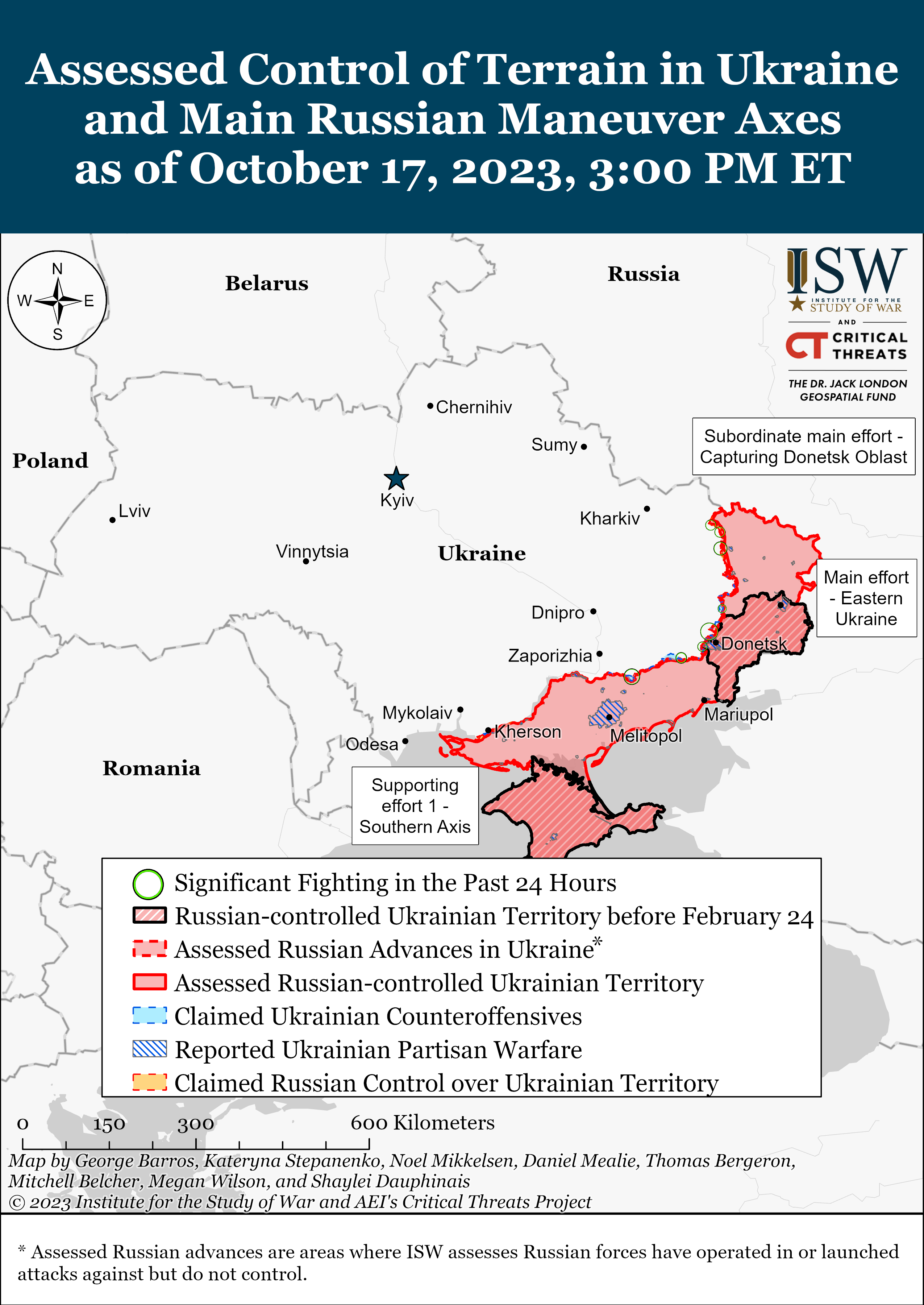
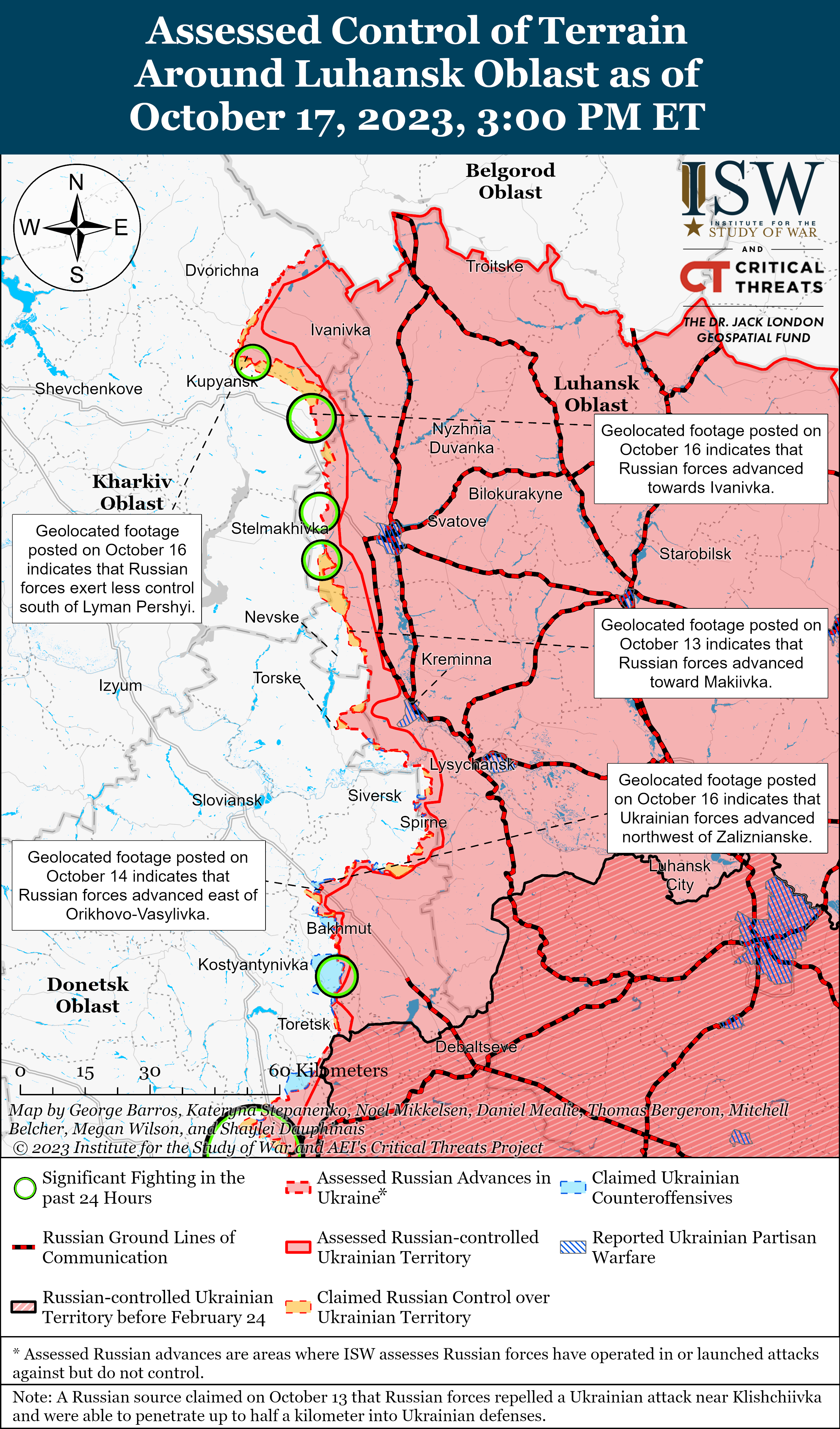
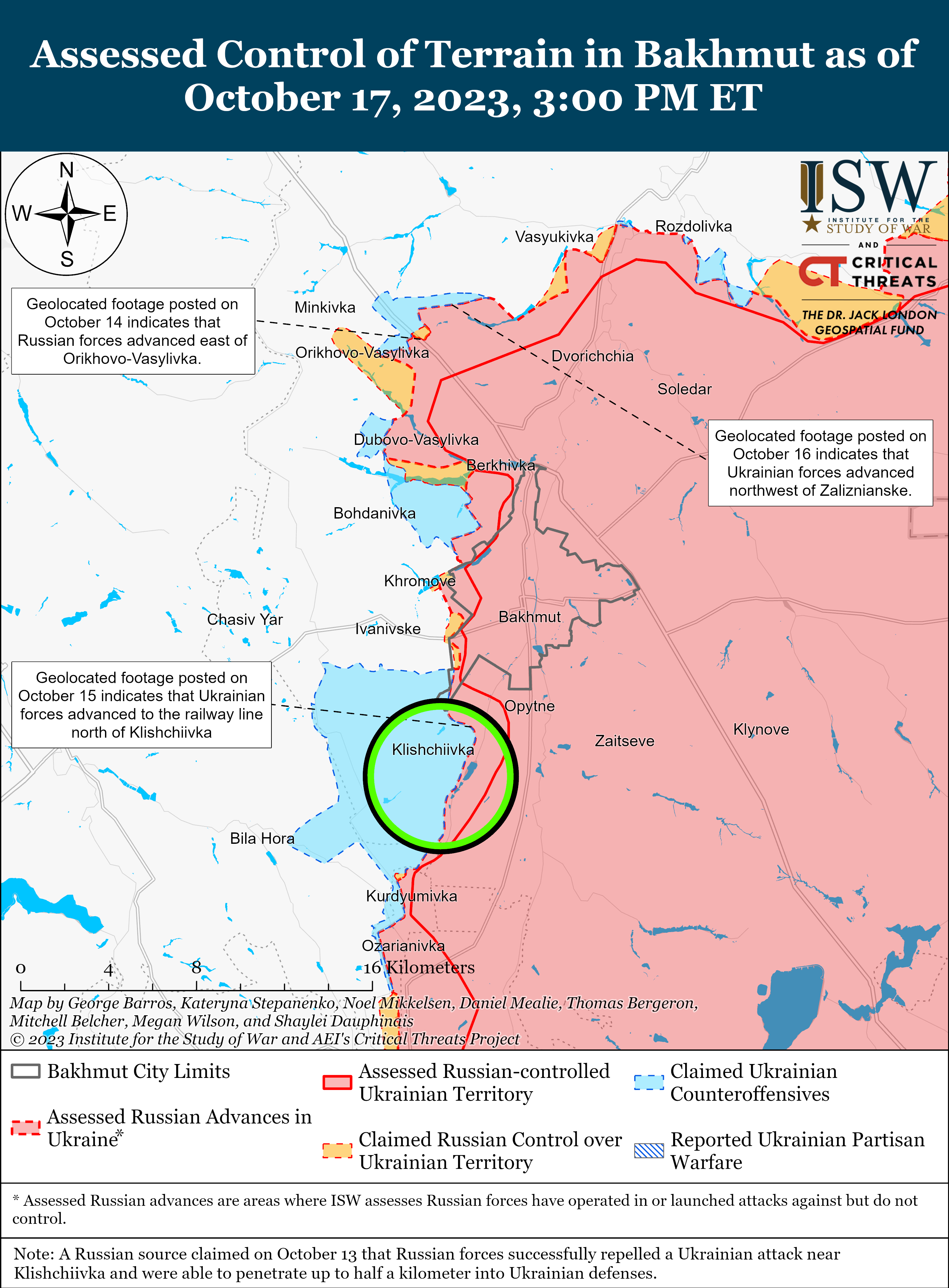
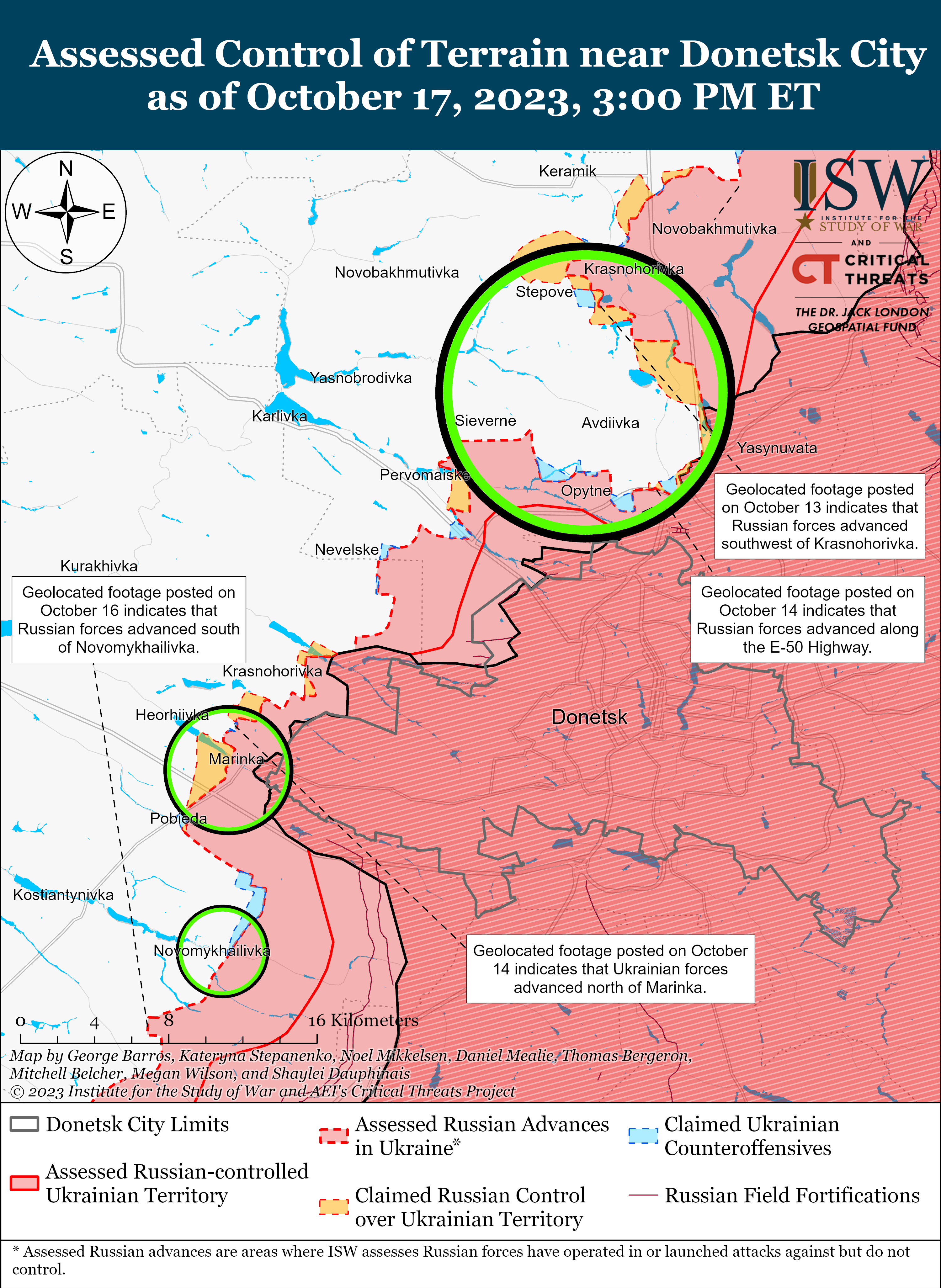
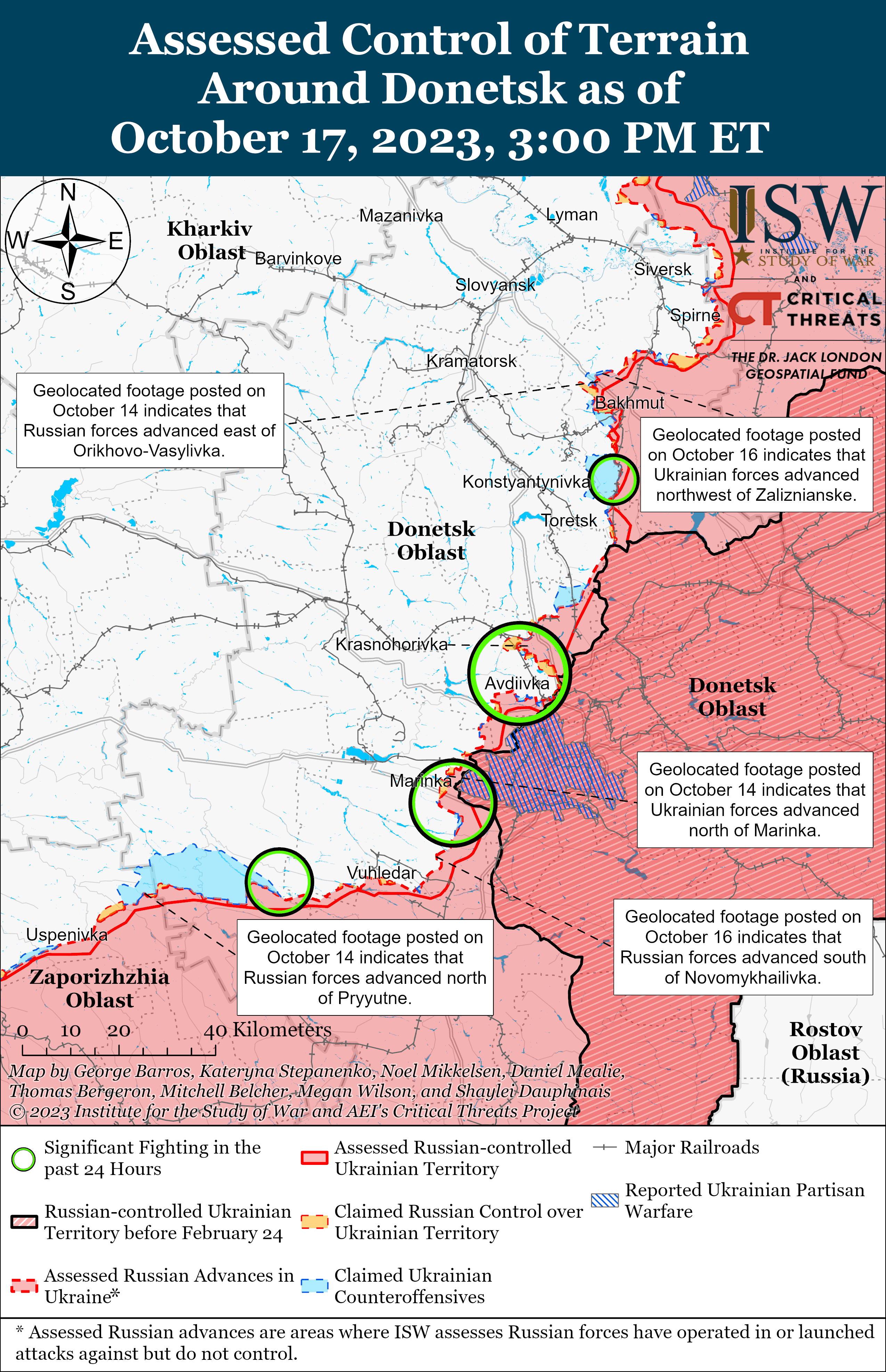
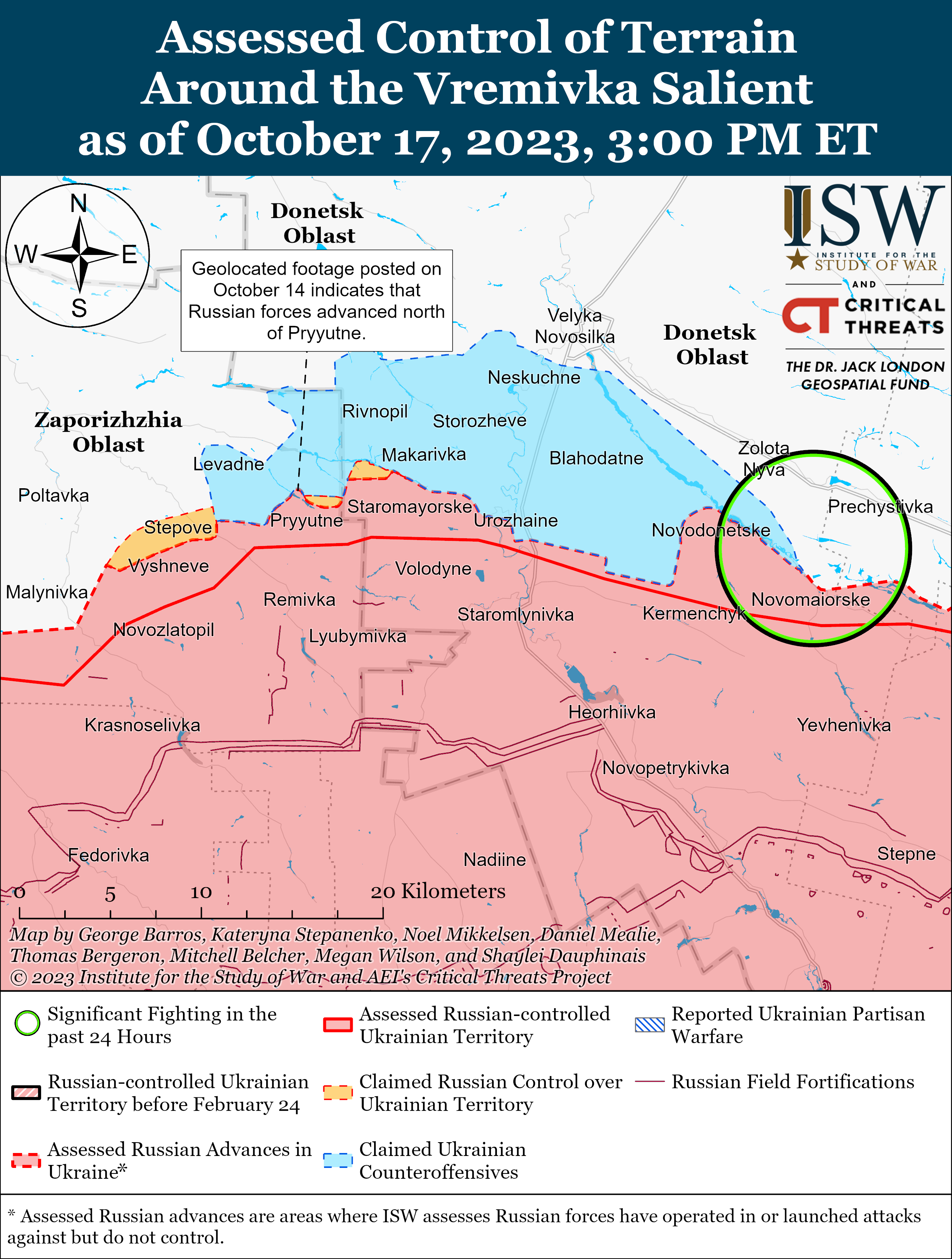
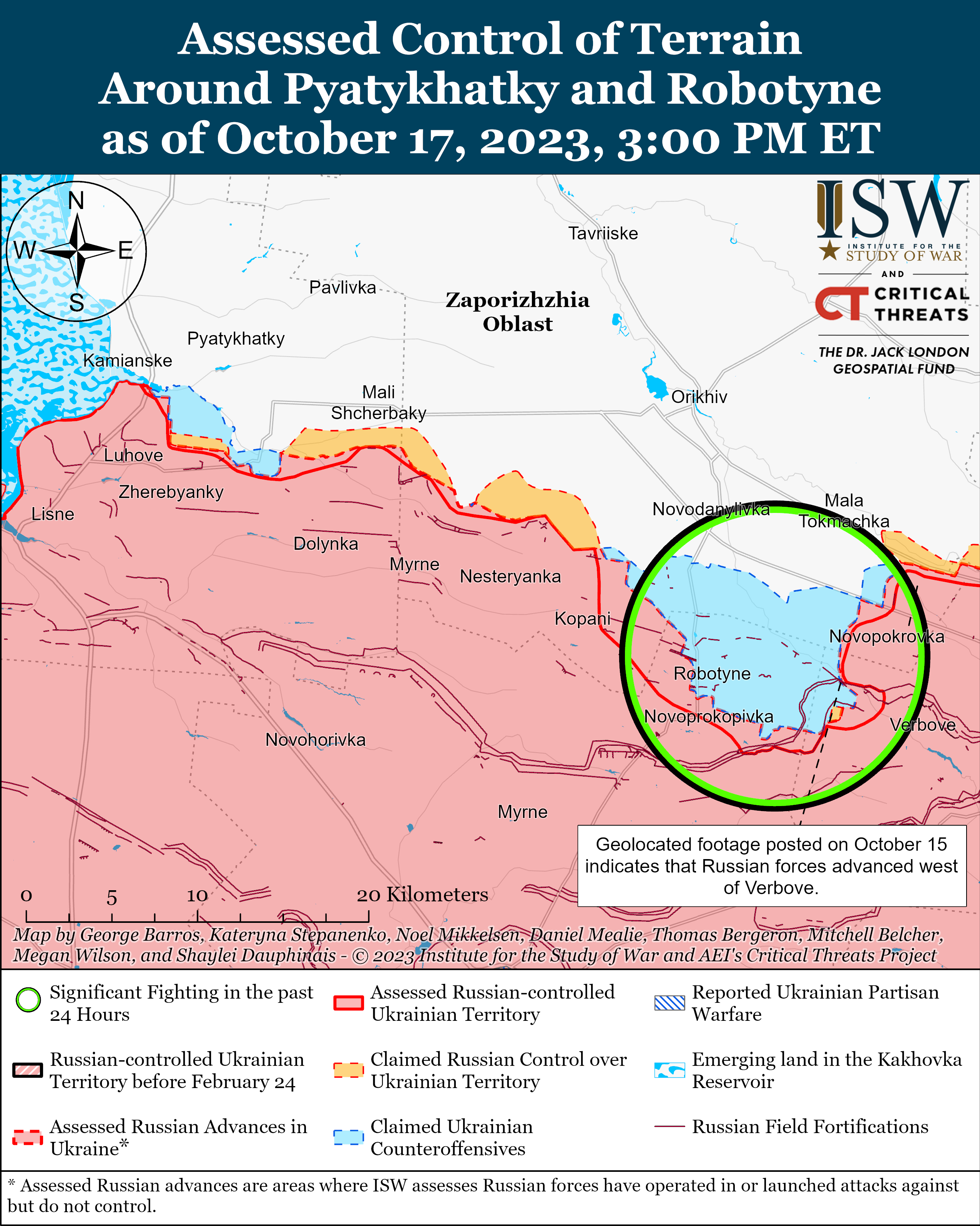
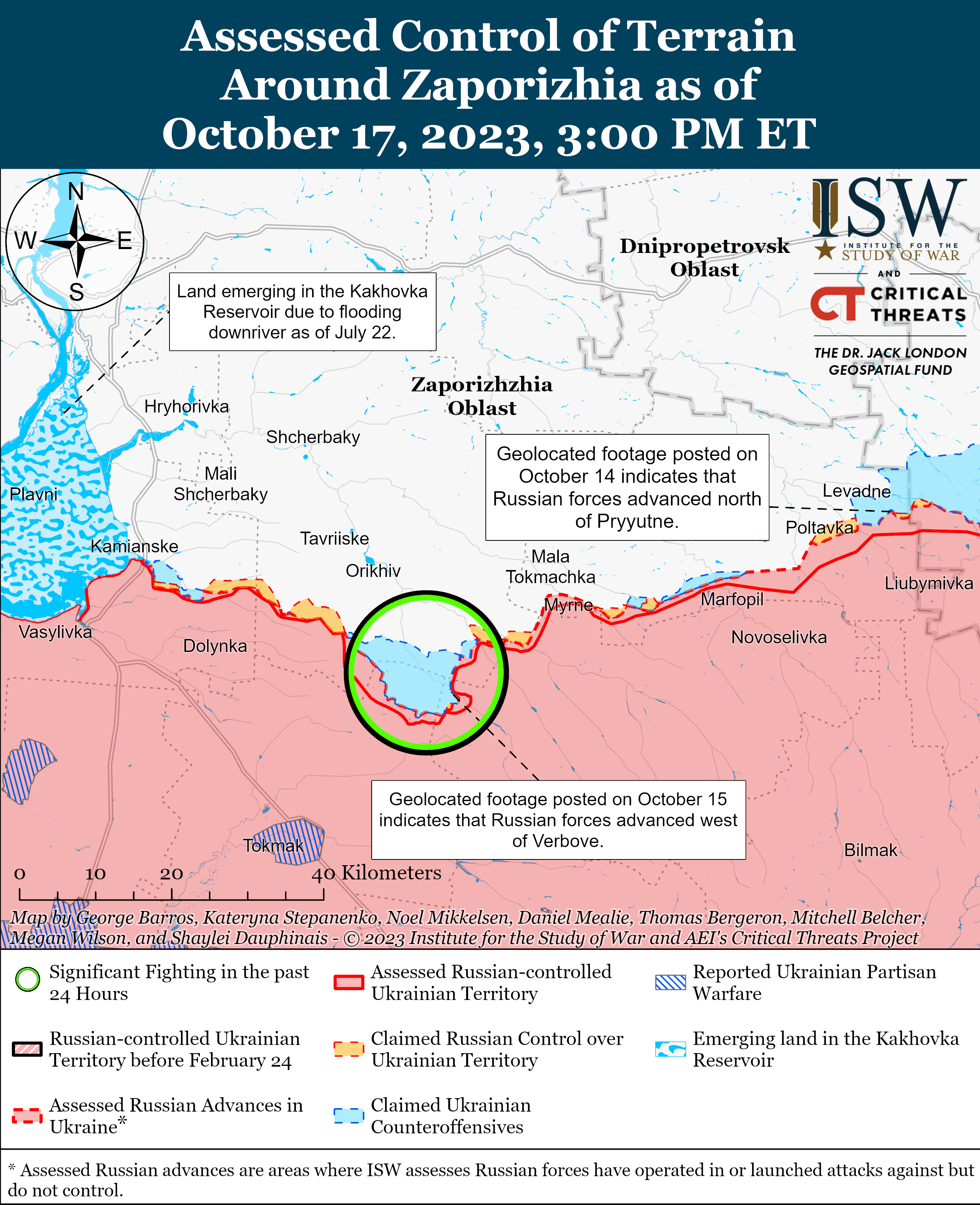
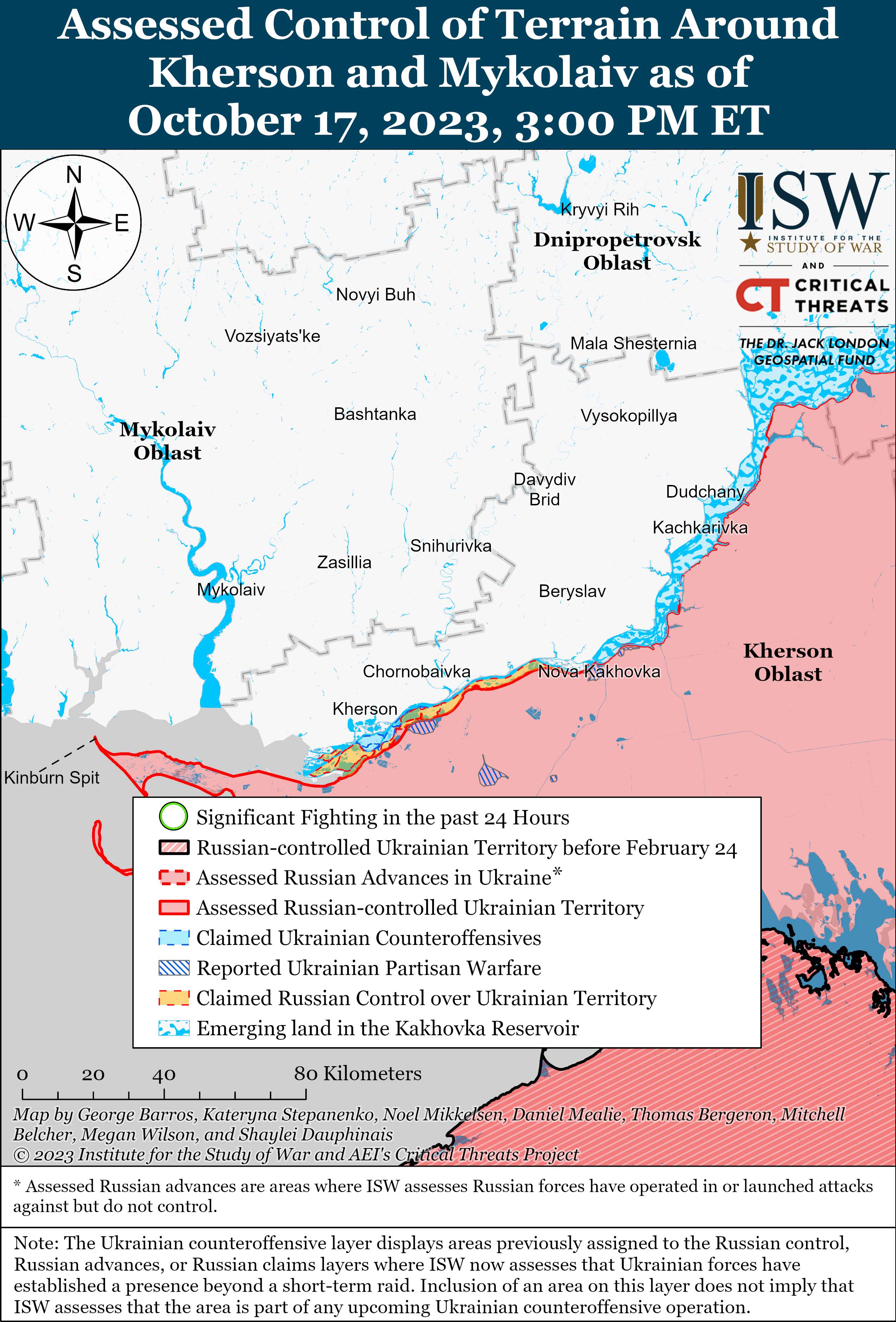
No comments:
Post a Comment